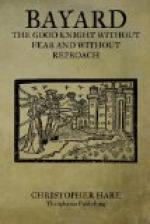This was the French plan to send provisions for the beleaguered city, a very difficult enterprise on account of the immense army which surrounded it. It was arranged that the cavalry should make a feigned attack on the side of Guinegaste, in order to draw the enemy in that direction, while eight hundred “stradiots” (light horse, chiefly Albanians in the service of France) were to make a dash on the other side, gallop through the defending force, reach the moat and throw in the bundles of provisions which they carried on the necks of their horses. This we are told the Albanians actually succeeded in doing, and it seemed as if this bold stroke would be successful, for the besieged, under cover of night, would be able to fetch in the much-needed provisions.
The French men-at-arms, meantime, had advanced to the attack and, after some skirmishing with the English and Imperial troops, were beginning to retreat somewhat carelessly, when they suddenly saw a number of foot-soldiers with artillery appearing on the top of the hill of Guinegaste, preparing to bar their way. Only then did they become fully aware of the imminent danger in which they were, and understood that, by some treachery, their plans had been made known to the enemy, who had thus made all preparations for their destruction.
King Henry VIII. had heard of the plan of relief, and before daybreak had placed ten or twelve thousand English archers and four or five thousand German foot-soldiers on a hillock with eight or ten pieces of artillery, in order that when the French had passed by, his men might descend and surround them, while in front he had ordered all the horsemen, both English and Burgundian, to attack them. When the French soldiers found themselves caught in this ambush, and the retreat was sounded by the trumpeters, they turned back, but were so hotly pursued that the gentle trot soon became a wild gallop and they fled in disorder, notwithstanding the cries of their captains: “Turn, men-at-arms, turn, it is nothing!” The Good Knight’s company was hurried along with the others, but again and again he rallied them, until at last he was left with only fourteen or fifteen men-at-arms on a little bridge only wide enough for two horsemen to pass at a time, while the stream was too deep to ford as it was dammed up to turn a mill. Here Bayard came to a stand and cried to his companions: “My friends, we can hold this bridge for an hour, and I will send an archer to tell my lord of La Palisse that we have checked the enemy and this is the place to attack them.”
We can picture to ourselves how gallantly he fought, for he loved nothing better than to defend a narrow bridge, but the pursuing army proved too overwhelming, for a company of horsemen went round beyond the mill and attacked the brave little party of defenders from behind. When Bayard saw that their position was desperate, he cried: “Gentlemen, we yield ourselves, for our valour will serve us nothing.




